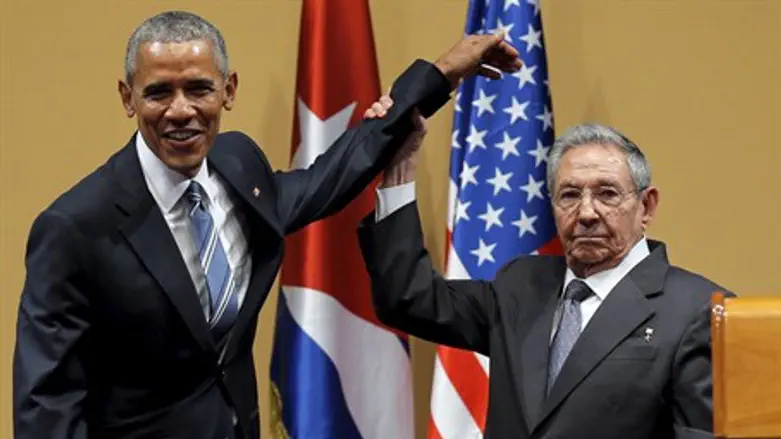
The world is following US President Barack Obama’s visit to Cuba with particular attention. The visit comes 88 years after the last US President stepped foot on the lands of what is today the Communist stronghold in closest proximity to America.
Dr. Margalit Bejarno, a Hebrew University professor and expert on Cuban affairs, explained to Arutz Sheva why the visit is both historic and significant, beginning with the fact that the visit is “truly a historic event. It is nearly the first time that an American President steps foot in Cuban soil.”
According to the professor, while the process to thaw economic ties between the two countries has already been in motion for 18 months, during which deals were signed and limitations against relations between the countries were removed, “This (visit) is still a very significant and very historic gesture.” Nevertheless, she added that “there are still many problems and conflicts yet to be solved between Cuba and he US that will take years to iron out.”
What about the Cubans? Who, in Cuba, allowed this change to take place? According to Dr. Bejarno’s estimations, the source of the change is the change in leadership from Fidel Castro to his brother, Raul, who “decided to change the traditional policies his brother held, policies that dictated total hostility towards the US. His chief interest was Cuba’s economy, and the country’s rehabilitation and integration in the global network. They hope that it will lead to an end of the embargo, which bears the brunt of the blame for Cuba’s economic state.”
The professor added that alongside Cuba’s economic hopes, the country fears a change of its the internal political network, as a result of having closer ties with the US.
“The Cuban government is not interested in democratization, nor is it interested in changing the form of its current government. They hope to control the situation, which will lead to economic openness like in the case of China, but do not hope for political openness.”
Regarding the American hold of the Guantanamo prison, the military facility run by the US on Cuban soil for over 100 years, Dr. Bejarno estimates that no significant changes will take place.
“It is a frog stuck inside their throats for over 100 years, 118 years to be exact. For now, nothing can be done until Congress decides to give in. It is a symbolic matter for the US to hold land in Cuban territory. It is extremely bothersome to them from a symbolic perspective, but I is still not what will determine the nature of future relations between the US and Cuba. Economic and political relations are most important.”
“Many observers said that if there were economic ties with the US and a McDonald's in Havana it would topple the Cuban regime. I don’t know if there will be a McDonald's in Havana any time soon, but it is clear to me that openness is much more effective that boycotts and embargoes,” she concluded.